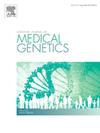Diagnostic delays in rare genetic disorders with neuropsychiatric manifestations: A systematic review
IF 1.7
4区 医学
Q3 GENETICS & HEREDITY
引用次数: 0
Abstract
A systematic review of case reports, case series, and case-control studies was conducted to quantify the diagnostic delay in 84 rare genetic diseases where neuropsychiatric symptoms may be primary or part of the early clinical presentation. Data abstracted from 1221 published articles encompassing 1838 individual cases revealed a mean diagnostic delay of 9.3 ± 8.7 years, with no significant improvement in time to diagnosis over the 65-year period from 1958 to 2023. Subanalysis of the most recent 10 years, 2014–2023, revealed no change in diagnostic delay, even when stratifying by genetic and other diagnostic tests. Neuropsychiatric symptoms were reported in 68 % of the included cases. Following a definitive diagnosis and optimized management of the underlying rare genetic disease, 66 % of individuals experienced an improvement in their neuropsychiatric symptoms. Despite increasing access to, and substantial advancement in, genetic and other testing, diagnostic delays remain lengthy for individuals affected by these rare genetic diseases. This often results in suboptimal management of the associated neuropsychiatric symptoms. Thus, earlier implementation of genetic testing and other diagnostic tools may reduce these delays, improving patient outcomes and alleviating the burden of diagnostic uncertainty.
具有神经精神表现的罕见遗传疾病的诊断延迟:系统回顾
对病例报告、病例系列和病例对照研究进行了系统回顾,以量化84种罕见遗传性疾病的诊断延迟,其中神经精神症状可能是主要症状或早期临床表现的一部分。从1221篇已发表的文章中提取的数据显示,1838例病例的平均诊断延迟为9.3±8.7年,从1958年到2023年的65年期间,诊断时间没有明显改善。对最近10年(2014-2023年)的亚分析显示,即使通过遗传和其他诊断测试进行分层,诊断延迟也没有变化。其中68%的病例有神经精神症状。经过明确的诊断和对潜在罕见遗传病的优化治疗,66%的患者的神经精神症状得到改善。尽管越来越多地获得遗传和其他检测,并在这方面取得了重大进展,但对这些罕见遗传病患者来说,诊断延误的时间仍然很长。这往往导致对相关神经精神症状的管理不理想。因此,尽早实施基因检测和其他诊断工具可以减少这些延误,改善患者的预后,减轻诊断不确定性的负担。
本文章由计算机程序翻译,如有差异,请以英文原文为准。
求助全文
约1分钟内获得全文
求助全文
来源期刊
CiteScore
4.10
自引率
0.00%
发文量
193
审稿时长
66 days
期刊介绍:
The European Journal of Medical Genetics (EJMG) is a peer-reviewed journal that publishes articles in English on various aspects of human and medical genetics and of the genetics of experimental models.
Original clinical and experimental research articles, short clinical reports, review articles and letters to the editor are welcome on topics such as :
• Dysmorphology and syndrome delineation
• Molecular genetics and molecular cytogenetics of inherited disorders
• Clinical applications of genomics and nextgen sequencing technologies
• Syndromal cancer genetics
• Behavioral genetics
• Community genetics
• Fetal pathology and prenatal diagnosis
• Genetic counseling.

 求助内容:
求助内容: 应助结果提醒方式:
应助结果提醒方式:


